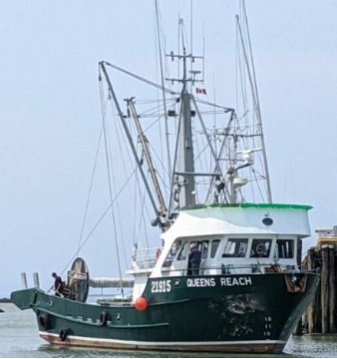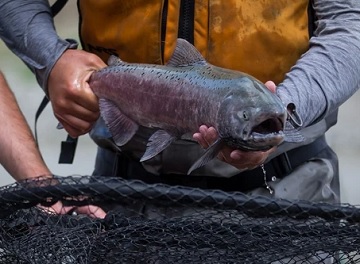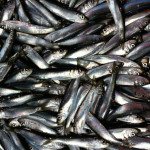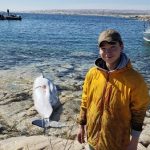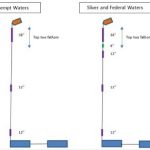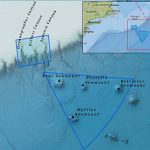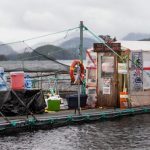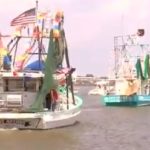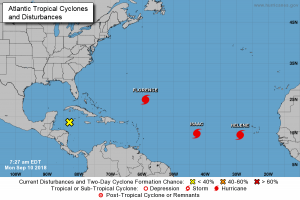Tag Archives: British Columbia
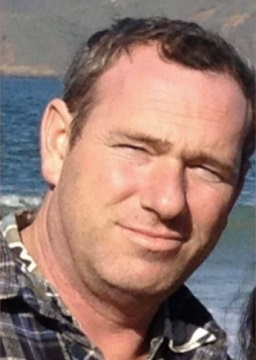
Frustration grows as captain still missing, boat still submerged in Okanagan Lake
It’s been more than three days and there is still no sign of Travis Van Hill, whose shrimp boat capsized on Okanagan Lake during a storm Monday night, July 24. The boat captain’s wife, Kim Van Hill, is frustrated by the amount of red tape around rescuing her husband’s remains from the boat, the tip of which can be seen poking above the waters of Okanagan Lake near Ellison Provincial Park.“A dive team from Vancouver, the dive lead, said he’s never been in this type of rescue and he’s been doing it for 16 years,” she said of the process which has taken too long to recover Travis’ body. It is presumed that Travis is trapped in the boat, and Kim explained that WorkSafeBC needs to sign off on the recovery before the RCMP dive team can retrieve Travis from the boat. >click to read< 09:56
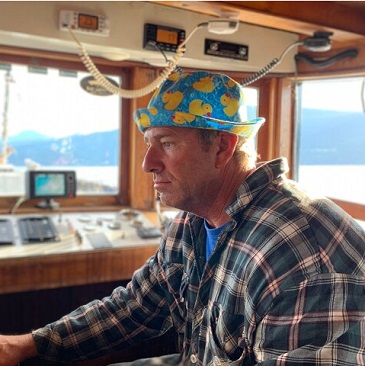
Fisherman missing on Okanagan Lake identified by family
Maddy Pool identified the missing man as her step-father, Travis Van Hill. She says Van Hill was working last night on a boat that fishes for shrimp at night. According to Pool, no storm was forecasted last night, which is why the boats went out. She said the company is “really smart” about storms. “There were two boats out there last night. The one boat made it in safe and the other one didn’t, which was the one that my stepdad was on.” The boat capsized near Ellison Provincial Park at the north end of the lake, and being that Van Hill was working, WorkSafeBC has been called in. >click to read< , and here. 10:50
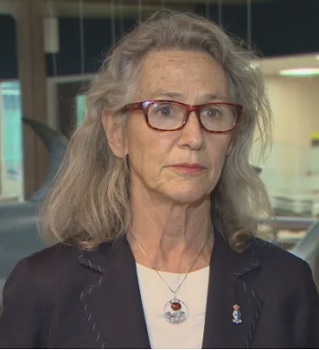
Vancouver MP Joyce Murray won’t seek re-election
Vancouver Quadra MP Joyce Murray has announced she will not run again in the next federal election. Murray is currently serving as the federal minister of Fisheries, Oceans and the Canadian Coast Guard. She announced her decision to not seek re-election on Twitter Tuesday. She says the decision came “after much thought and reflection,” adding this term will be her last. “My work in politics and time serving my community both federally and provincially as an elected official has been the honour of my life,” she said. >click to read< 14:42
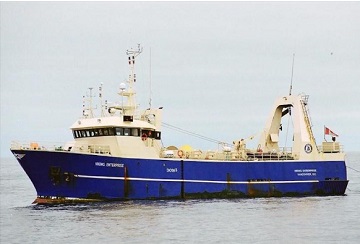
‘Reckless’: Richmond fishing firm fined $755K for ammonia release
A Richmond-based fishing company has been fined $755,000 related to the handling and discharge of ammonia in 2017, a Vancouver Provincial Court judge ruled July 19. Judge Ellen Gordon heard earlier the ammonia was taken from the Viking Enterprise trawler, stored on the Reagle wharf and then transported to the company operations near Jacombs Road and Cambie Road. The events took place Oct. 15, 2017 to Nov. 24, 2017, starting with the removal of ammonia from the trawler as its refrigeration systems were being worked on. It was stored in a tank on the dock. It was determined the ammonia was contaminated and the company received an $819,000 quote for disposing of it. The company decided to look at other options. This is quite a story! >click to read< 20:27
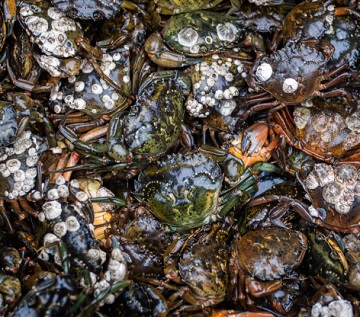
Crab ice cream, anyone? How we might be able to eat our way out of an invasive green crab problem
They’re tiny and they’re wreaking havoc on our coasts, but they also taste pretty good. European green crabs have posed a problem off the coast of Vancouver Island for decades now, and while current conservation efforts have focused on deep freezing them and throwing them in a landfill, some suggest eating them instead. The species, which is found across the Pacific Northwest is aggressive and feeds voraciously on shellfish; they have no natural predators, and they reproduce at a high rate. Each female can have up to 185,000 babies at a time. It’s not just a West Coast problem. Fisheries and Oceans Canada notes that the species, which originally came from Europe and North Africa and likely hitched a ride to North America on wooden ships in the early 19th century, first invaded east coast waters in the 1950s. >click to read< 09:50
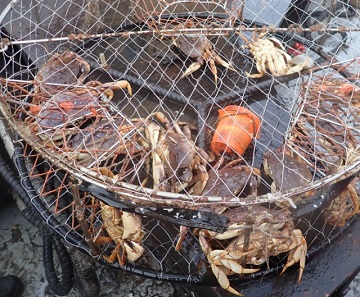
B.C. man fined $160K for breaking Canadian, U.S. fishing laws
A B.C. man who pleaded guilty to four counts related to breaching Canadian and U.S. fishing laws has been given a three-year deadline to pay $160,000 worth of fines. Judge Kimberly Arthur-Leung considered Hoan Trung Do’s fishing activities in Boundary Bay between July 15, 2018 and Oct. 31, 2020 before determining he’d “knowingly broke the law for financial gain and to the detriment of the environment,” according to a recent provincial court decision. The ruling explains that Do has been fishing since 1999 and therefore knew the regulations surrounding Boundary Bay, which is described as “a pocket of the Salish Sea bordering the joint Canadian and (U.S.) waters.” >click to read< 11:27
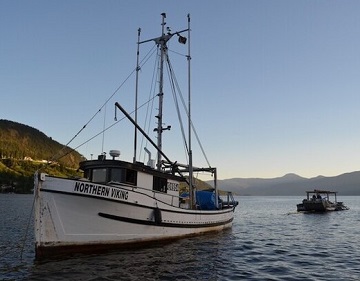
Learn all about Okanagan Lake’s shrimp boat fleet
You don’t have to be Forrest Gump to start your own career as a shrimp fisherman. In fact, Okanagan Lake has its own shrimp fleet. Piscine Energetics operates research vessels that harvest mysis shrimp from the lake. Harvesting has been ongoing each summer since 2000. It was started in response to falling kokanee numbers. The shrimp had been introduced in the 1960s and were seen as a food source for the fish. For a few years, record size kokanee were caught. But the plan soon backfired when it was realized the shrimp were competing for food with the kokanee fry. A recent ad recruiting shrimp boat deckhands explains Piscine’s “mission to restore fish populations to their natural levels through the management of invasive aquatic organisms.” Interesting video, >click to read< 10:08
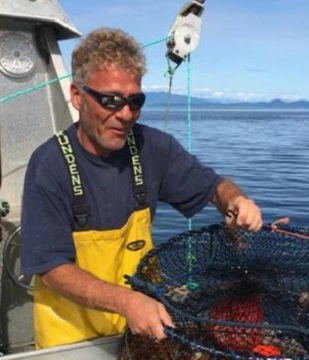
British Columbia: Steveston fishermen race against time for spot prawn season
The annual spot prawn season may feel short and sweet to seafood enthusiasts, but it’s even more pressing for the few spot prawn fishermen at Steveston’s Fisherman’s Wharf. The wild spot prawn, known for its eponymous spots, has a four-year life cycle and lives in “crystal clear, pristine waters” deep in the ocean. “By year number two, they transition into a female. And they spawn at year number four, and then they die,” said Frank “Fisherman Frank” Keitsch, who has been catching spot prawns for around 30 years. With the fishing grounds being far away from Steveston, only around four local boats are able to cover the distance. >click to read< 11:35
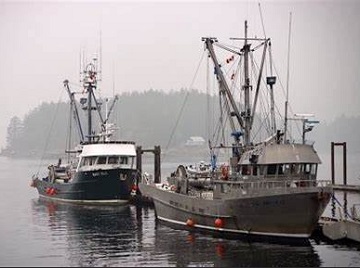
Fish fight over West Coast licences and quota resurfaces at federal committee
A parliamentary committee investigating whether corporations and foreign owners have a stranglehold on Canadian fisheries is experiencing a serious case of deja vu. Witnesses speaking about the dire straits faced by commercial fish harvesters and coastal communities on the West Coast are raising the same issues first presented to the Standing Committee of Fisheries and Oceans (FOPO) starting in 2018.Independent operators, First Nations and young fishers are being squeezed out by skyrocketing prices for commercial fishing licences and quota, a set share of the allowable catch, witnesses told the committee at ongoing meetings starting May 8. >click to read< 15:23
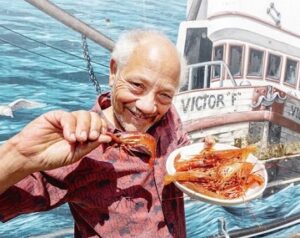
BC fishing industry’s ‘Christmas season’ – it’s time for spot prawns
It’s time to fire up the barbie: Spot prawn season has arrived. “It’s the Christmas of the fishing season,” says Jennifer Gidora, operations manager at Finest At Sea Ocean Products in James Bay. Prawns caught daily by the company’s vessel Nordic Spirit, under Capt. Alec Fraumeni, land at Fisherman’s Wharf and are delivered across the street to the store. Spot prawns, with a season that often runs four to six weeks, have a “cult-like following,” Gidora said of the excitement surrounding the fishery. Prices have rebounded to pre-pandemic levels, Wednesday’s price was $34 per pound for live prawns and $60 per pound for fresh prawn tails. >click this to read< 11:36
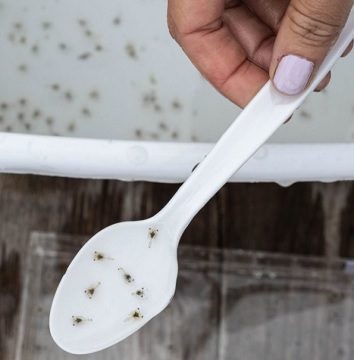
Shining the Light on Baby Crabs
The light trap at Whaler Bay is one in a network of 20 traps placed throughout the Canadian side of the Salish Sea, from Read Island in the north to James Island near Sidney in the south, as part of the Hakai Institute’s multiyear Sentinels of Change program. Launched in 2022 to mark the United Nations Decade of Ocean Science for Sustainable Development, this community-centered initiative involves understanding how marine invertebrates are adapting to the changing environment. The light trap project, which focuses on the native Dungeness crab—a much-loved treat on the coast that can grow to the size of an adult’s outstretched hand—is a part of this program. Photos, >click to read< 10:17
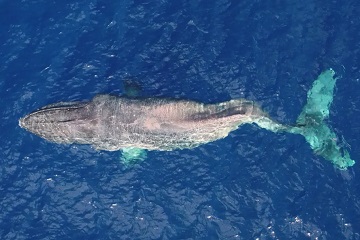
Ship Strikes: Thousands of whales are being killed by passing ships. Can we save them?
A collision with a vessel is one of the main threats to whales and if the whale does not die on impact, it is usually only a question of time. In Moon’s case, Wray knows she made the 3,000 mile migration to Hawaii. “We’re actually hoping that she has passed,” says Wray. She has not been seen since December. With potentially thousands of whales hit every year, and with the number of ships rapidly increasing across the globe, the problem is only getting worse. But as the recent UN high seas treaty shows, there is increasing political will to protect the world’s oceans and their inhabitants. The question is whether it is even possible to save the whales from dying at the bows of ships. New technology suggests yes – but it’s going to take all hands on deck. >click to read< 08:01
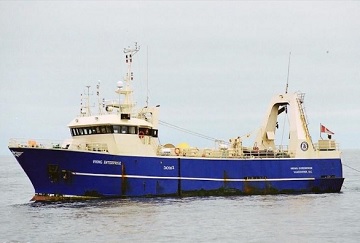
‘Potentially lethal’: Crown wants $2.95M in fines for Richmond ammonia release
A Richmond-based fishing company should pay $2.95 million in fines related to the handling and discharge of ammonia in 2017, a Vancouver provincial court judge heard March 29. Judge Ellen Gordon heard the ammonia was taken from the Viking Enterprise trawler, stored on the Reagle wharf and then transported to the company operations near Jacombs Road and Cambie Road. “This was a horrific incident, a very dangerous incident,” Gordon said. Multiple individual and corporate defendants pleaded guilty to three counts from an indictment of 10 that involved the transportation, storage and then venting of the potentially lethal substance into the air or runoff into a storm drain to a nearby slough. >click to read< 08:05
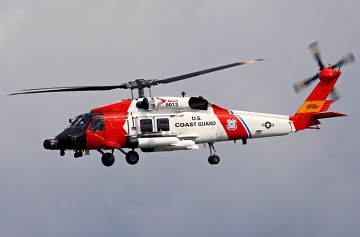
Coast Guard aircrew medevacs Canadian crewmember from 72′ fishing vessel near Graham Island, British Columbia
A Coast Guard Air Station Sitka aircrew medically evacuated a 24-year-old crewmember from a Canadian vessel located northwest of Graham Island in British Columbia on Friday. The MH-60 Jayhawk helicopter aircrew arrived on scene at 7:58 p.m. and safely hoisted and transported the patient to shore in Masset, a village in British Columbia, where he was then transferred to awaiting EMS. >click to read< 17:12
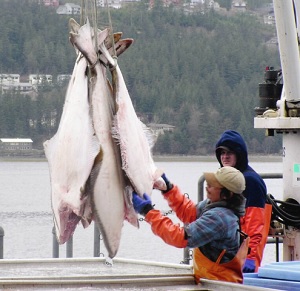
Halibut treaty marked new era in Canadian independence
On March 10, the 2023 wild Pacific halibut fishing season opens. Fishers licensed accordingly will be able to harvest the white-fleshed groundfish from Bering Strait to California until early December. That there is a halibut season at all on this coast is due to an agreement signed a century ago between the U.S. and Canada. The 1923 Convention between Canada and the United States of America for the Preservation of the Pacific Halibut Fishery of the Northern Pacific Ocean and Bering Sea, also known as the Halibut Treaty of 1923, is the first environmental treaty designed to conserve ocean stocks of a fish. It is also the first treaty the Canadian government negotiated and signed independently. >click to read< 12:43
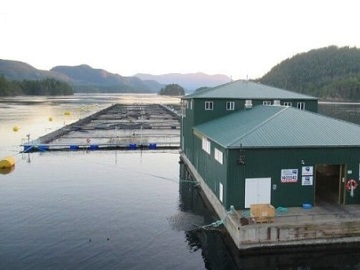
Canada Shuts Down 15 Fish Farms in B.C., Citing Risks to Wild Salmon
After years of concerns over the impact of aquaculture on wild sockeye salmon, Canada’s fisheries department has decided not to renew the operating permits of 15 Atlantic salmon farms in an environmentally sensitive area of British Columbia. In a news release, Fisheries Minister Joyce Murray noted that B.C.’s salmon runs are in “serious, long-term decline,” and some are at risk of collapse if action is not taken. Ten years have passed since the Cohen commission’s report, and more recent research indicates that the diseases associated with salmon-farming may have an impact on wild salmon in general and on Fraser River salmon smolts in particular. >click to read< 16:00
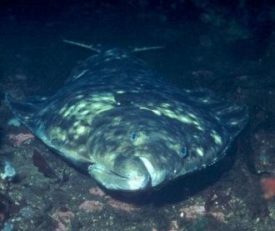
Commission releases halibut quotas
The International Pacific Halibut Commission has released the quotas for the 2023 season, and they seem to be more aligned with reality than the increases the past two years, with the IPHC describing the overall biomass as being at “historic lows.” Quotas are down across the board in Alaska and Canada, especially in Areas 3A and 4A. Area 2B, British Columbia, also took a hit, with a quota of 5.03 million pounds, down 11.75%. Fishermen are becoming distrustful in the IPHC process, according to fisherman and fisheries advocate Buck Laukitis. “The IPHC management process is more political than science-based,” he said via text. “Long-time fishermen and those interested in having something to catch a generation from now are losing confidence in an overly complicated and very political process.” >click to read< 18:11
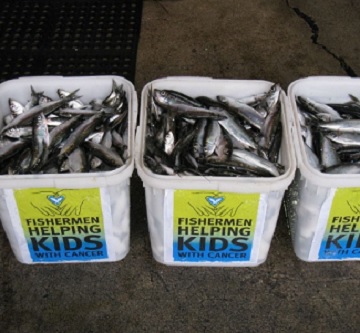
Herring sale returns to Steveston this weekend
Organized by charity Fishermen Helping Kids with Cancer, the 12th annual herring sale will take place at Steveston Harbour Authority on Trites Road on Saturday, January 21 from 8 a.m. to 2 p.m. Later this week, a few herring seiners will be fishing north of Nanaimo and, depending on the weather, they hope to catch 50 tons of tasty herring for thousands of customers in Steveston and at the other sale in Victoria Since 2011, commercial fishing industry has raised close to $1 million for kids being treated for cancer at BC Children’s Hospital. Fishermen and key fish companies cover all costs of the event so 100 per cent of the funds raised at the sale go to the kids. >click to read< 17:56
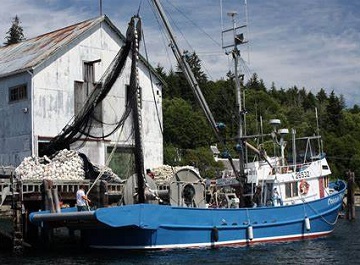
Feds launch licence buyback plan to scale down B.C.’s salmon fishing fleet
Looking to fix the problem of too many boats chasing too few fish, on Wednesday, Fisheries and Oceans Canada (DFO) unveiled details on its voluntary commercial licence retirement (LRP) program that will pay salmon harvesters to exit the industry. However, the union for commercial fishers says first impressions suggest the plan is “deeply disappointing” and designed to drive down the value of licences being bought out. DFO is allocating $123 million from its Pacific Salmon Strategy Initiative for the licence buyback and two additional future programs. >click to read< 08:30
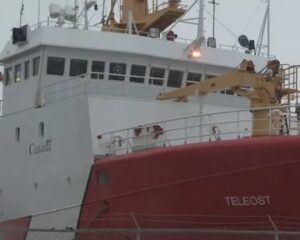
Canadian Coast Guard can’t retire old fisheries science vessels on East Coast
Canada is extending the life of its two aging offshore fisheries science vessels on the East Coast as the Canadian Coast Guard struggles to bring their replacements into service. The transition has floundered because of breakdowns, unplanned maintenance and refits on both new and old fisheries science vessels. In response, Fisheries and Oceans Canada (DFO) has now postponed the planned retirement of 40-year-old CCGS Alfred Needler on Dec.31 and 34-year-old CCGS Teleost set for March 2023. >click to read< 09:18
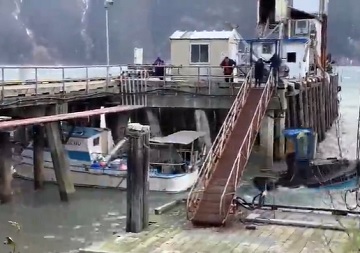
Workers rescue Bella Coola fishing boat jammed under a pier in Bella Coola harbour
Two pile drivers are being hailed as heroes after they rescued a fishing boat that was jammed under a pier in the Bella Coola harbour on Monday, Nov. 7. The risk of the situation was heightened by the fact there are seven fuel pipelines connected to the Columbia Fuels dock at the pier. Had the boat hit them, it could have been a disaster, the operations supervisor for the Bella Coola branch of Columbia Fuels Jordan Prong said. At around 8:30 a.m. Monday, the Algoma 2 fishing boat was under the dock and ramming into the pilings, said its owner’s husband Carl Schooner. “We did not know what to do.” Video, >click to read< 07:58
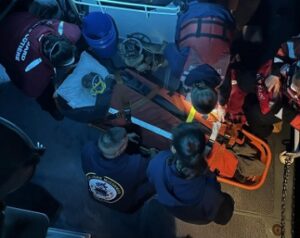
U.S. Coast Guard Cutter John McCormick crew medevacs fisherman in Canadian waters
The crew of U.S. Coast Guard Cutter John McCormick medevaced an injured fisherman Saturday in Canadian waters off Vancouver Island. A small boat crew launched from the cutter and boarded the fishing vessel F/V Miss Norma in the vicinity of Johnstone Strait, British Columbia, where they administered first aid to the 67-year-old man, who was suffering symptoms of a concussion and a broken arm. The crew placed him in a rescue litter, loaded him onto the small boat, and transferred him to the John McCormick. Photos, >click to read< 21:18
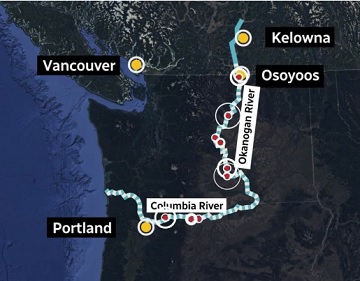
Okanagan First Nation fishery celebrates record return of sockeye salmon
An estimated 670,000 sockeye have entered the Columbia River system this summer on a nearly-1,000-kilometre upstream journey toward spawning grounds in creeks and rivers, according to fish biologists with the ONA. More than 80 per cent of those fish are destined for Canadian waters near Osoyoos, B.C., in the south Okanagan, said Richard Bussanich, the organization’s head fish biologist. “This is a great story,” Bussanich said. “We’ve got more fish than spawning habitat coming back.” In partnership with Canadian and U.S. agencies, First Nations in the Okanagan have worked to restore the migration channels and re-introduce sockeye to the region over the past two decades, each year expanding spawning territory further into the valleys’ creeks and rivers. >click to read< 11:47
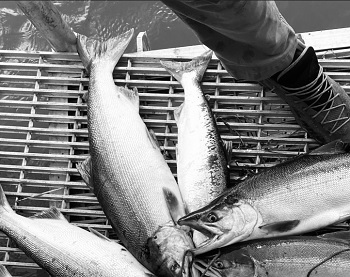
B.C. fishermen fume as their Americans counterparts fish
Commercial salmon fishers and environmentalists are crying foul, for opposite reasons after U.S. fisheries officials let American fishers hit the water while the Canadian government kept their counterparts ashore. After several years of historically low runs, the Pacific Salmon Commission (PSC), an international fisheries management organization, estimated last week that enough sockeye, about 4.4 million, would return to the Fraser River to support a commercial fishery. American fisheries managers adopted the commission’s estimate, opening a small commercial fishing window over the weekend. But in a rare disagreement, Canadian officials did not, citing concerns the run would be nearly one million fish smaller than predicted, and kept Canada’s waters closed. >click to read< 10:16
Concern for BC sockeye salmon as return estimates drop by millions – The Pacific Salmon Commission’s pre-season estimate of 9.8 million returning fish went down to 5.5 million Monday, prompting environmentalists and fishers alike to express concern. >click to read<
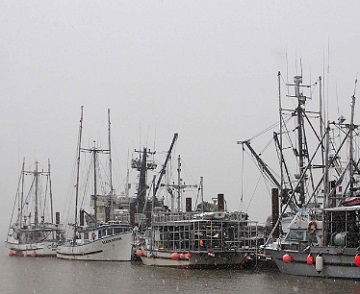
B.C. Commercial fishermen on tenterhooks
B.C. commercial fisherman, who had hoped for a green light today, now have to wait until next week for a go-ahead to fish for Fraser River sockeye, while American commercial fishermen are already catching sockeye. “They’re fishing on the American side, but we’re not fishing on the Canadian side,” said Mitch Dudoward, a commercial fisherman and spokesperson for the UFAWU-Unifor fishermen’s union. Returns so far appear to be healthy enough for a commercial opening this year, and fisherman had expected commercial openings to be announced today. But they now have to wait until Tuesday. >click to read< 9:16
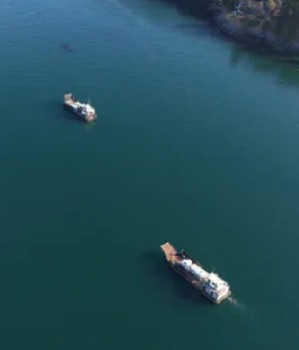
Sunken fishing boat shifts into deeper water in Salish Sea leaking fuel in orca habitat
An update from the U.S. Coast Guard says the 15-metre F/V Aleutian Isle has shifted since it went down Saturday off Washington state, near San Juan Island, roughly 25 kilometres east of Victoria. The vessel, loaded with about 10,000 litres of diesel and oil, was originally resting in about 30 metres of water, but U.S. officials say it is now some 60 metres below the surface. The coast guard says the added depth presents more logistical challenges that the on-scene dive team is working to resolve. Divers are also trying to gather and remove a large fishing net that has floated free of the wreck and the Coast Guard update says officials are watching the area closely even though no marine mammals have been reported nearby. >click to read< 17:55
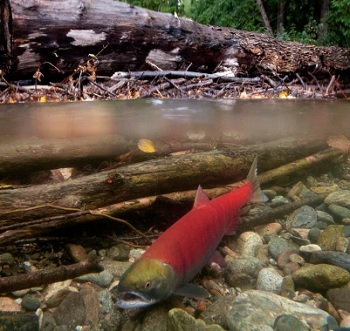
Commercial fishers and wild salmon advocates celebrate large returns to B.C. waters
Mitch Dudoward has worked in the salmon industry for more than 40 years and says fishing on the Skeena River in northwest B.C. has never been better. “This is the best season I can recall in my lifetime with the numbers we are catching,” said Dudoward, who recently completed a big sockeye haul aboard his gillnetter Irenda. Meanwhile, Bob Chamberlin, chairman of the First Nations Wild Salmon Alliance, said thousands of pink salmon are in Central Coast rivers after years of minimal returns. The strong run comes two years after the closure of two open-net Atlantic salmon farms in the area. “We got them removed and two years later we went from 200 fish in the river to where we have several thousand to date. In our mind and knowledge that is a really clear indicator.” >click to read< 10:41
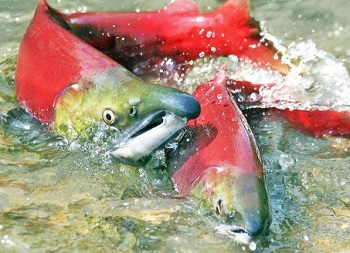
Prince Rupert fisherman frustrated by DFO salmon limits, despite millions of fish
Longtime marine fisherman Howard Gray is frustrated with the federal government’s management of the commercial sockeye harvest around Prince Rupert and afraid it will lead to two million dead fish that should have been caught in the ocean this year, he said on Aug. 3. Gray has been commercial fishing on the North Coast for more than 60 years, primarily harvesting salmon and herring. “A multi-million dollar travesty is happening as we speak. There’s going to be in excess of three million fish, sockeyes, going into the system, which is about two million more than there should be,” he said. Gray believes the rules that Fisheries and Oceans Canada (DFO) announced regarding the commercial sockeye fishery were not in line with the high number of fish returning this year. >click to read< 08:25






